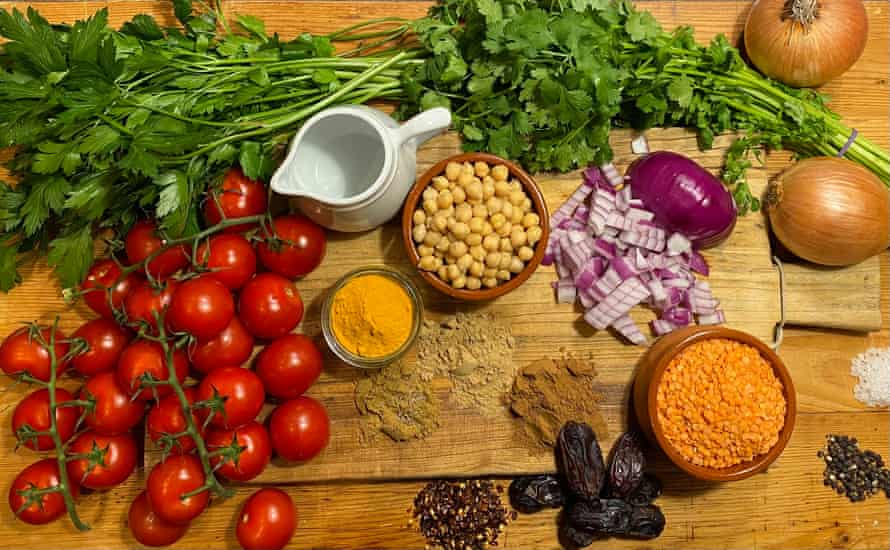Food has a special place in Ramadan.
Over the years I’ve been a guest at many “iftar” dinners, breaking the daily Ramadan fast with Muslim friends and colleagues. Sharing food, culture and conversation has forged real friendships, increased my understanding and love for the diversity of cultures and histories that make up modern Australia, and added a host of new recipes to my repertoire. In homes around the country, people are retracing traditions from all four corners of the globe – and creating new ones.
As a bit of background, Ramadan commemorates the time when the Prophet Muhammed is believed to have received the first revelations that would become the Qur’an, the central religious text of Islam. It’s the most important month in the Muslim calendar and a time for self-reflection, self-restraint and charity. Ramadan is the ninth month of the Islamic calendar and officially starts with the first sighting of the new crescent moon. This year that will be Monday 12 or Tuesday 13 April.
Fasting from dawn to dusk is a practiceof self-sacrifice to cleanse the soul and increase empathy for those less fortunate, particularly those facing poverty and hunger. Breaking the fast and the meal that follows is about sharing what you have, an act of hospitality and charity – and often a veritable feast.
Traditionally the fast is broken with a date, but after that first date the food that goes on the table, the ingredients, the way it’s eaten, and the family stories that go with it can be very different – whether your family originally comes from Syria or Somalia, Bosnia or Bangladesh, Pakistan or Palestine, Morocco or Malaysia, Iran or Indonesia, Jordan or Japan.
Last year, when the first Covid-19 lockdowns made face-to-face iftars with extended family, neighbours, friends, colleagues and the wider community impossible, several community organisations whose Ramadan plans were thwarted came together to help create Recipes For Ramadan: an invitation to a virtual iftar.
In lieu of face-to-face gatherings, we shared recipes and family stories online and through social media. One for every night of Ramadan.
On a crazy turnaround we pulled together 33 recipes and stories from 15 different countries: from Afghanistan, the Cocos Islands and Egypt; India and Iraq; Japan and Jordan; Kurdistan, Lebanon, Morocco and Palestine to Scotland, Somaliland, South Africa and Turkey.
This year, we’re aiming to double that with recipes from Bosnia, Saudi Arabia and Pakistan already in the pipeline.
After the first date which breaks the fast, an iftar meal often starts with a soup which kickstarts the digestion after a day without food. So it makes sense to start this series that way too.
One of my favourites is a popular traditional harira soup served on the streets of Morocco and Algeria at sunset. The ingredients are tomatoes, chickpeas and lentils dressed up with lots of fragrant spices and fresh herbs. Some versions include meat but mine – found years ago in a fascinating book called Sacred Food by Elisabeth Luard – is a simple tomato and onion soup with chickpeas, lentils, cinnamon, ginger, chillies, coriander and lemon.
It can be thrown together in minutes from ingredients you probably have in your pantry, which makes it ideal for weekday evenings. Warming and hearty, it is almost a meal in itself – whether you’re fasting or not. My quick cheat’s version couldn’t be easier.
*****
Jane’s Moroccan harira soup

This soup is easy to make but for an even easier version, use tinned tomatoes and tinned chickpeas to avoid soaking overnight. For vegetarians or vegans, as one of my daughters now is, replace the chicken or lamb broth with vegetable stock. Or for extra oomph for carnivores, use the meat and bones of chicken, lamb or beef to strengthen the broth. Either way, it’s heavenly.
250g (1 cup) dry chickpeas, soaked overnight, rinsed and drained
2 litres unsalted chicken or lamb stock
1 tsp cinnamon
1 tsp ginger
1 tsp cumin
1 tsp powdered turmeric
1 tsp dried chillies
1 onion, finely chopped
125g (half cup) red lentils
1kg of tomatoes, skinned and chopped
Salt and freshly ground black pepper
Olive oil
Parsley, finely chopped
Coriander, finely chopped
In a large pot, cook the chickpeas in the stock over medium heat for at least two hours, until tender. Don’t add salt or allow the liquid to come off the boil. Add more boiling water to maintain the liquid volume if needed.
When the chickpeas are perfectly soft, stir in the lentils, onion, tomatoes and spices, season with salt and pepper, bring back to the boil and simmer for another 30 minutes until the lentils are mushy and the soup is satisfyingly thick. Finish with a swirl of olive oil and a generous handful of chopped parsley and coriander.
Serve the soup in deep bowls, with lemon quarters for squeezing and a bowl of red dates “to make the heart glad”.
******
The Shahrouk sisters (2017 winners of Channel Nine’s Food Fight) also have a family recipe for lentil soup. Theirs has been passed down through their Lebanese family for generations.
Next week, they’ll share their family recipe for fattah, which makes a great weekend breakfast for those who aren’t fasting.
In the meantime, if you’ve never been to an iftar – or if you have – do check out the website, try the recipes, discover new people, get a taste of places you may not have visited.
And if you have a family recipe that you’d like to share, one that unlocks family stories and family history, share it here.
Ramadan Mubarak.
-
Guardian Australia will be publishing a recipe from Recipes for Ramadan every Saturday until 8 May, the weekend before Eid. You can find more recipes on the Recipes for Ramadan website; and follow the project on Instagram, Facebook or YouTube.
April 10, 2021 at 03:00AM
https://www.theguardian.com/food/2021/apr/10/recipes-for-ramadan-quick-and-easy-moroccan-harira-soup-from-jane-jeffes
Recipes for Ramadan: quick and easy Moroccan harira soup from Jane Jeffes - The Guardian
https://news.google.com/search?q=easy&hl=en-US&gl=US&ceid=US:en
No comments:
Post a Comment